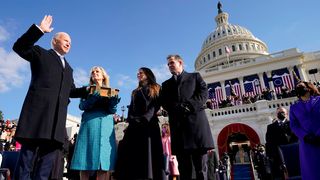The high watermark of inauguration speeches is Abraham Lincoln’s second inaugural address, delivered in 1865 to an exhausted Union, with the end of the Civil War just a month away. Its spare 700 words are inscribed in the Lincoln Memorial at the western end of the National Mall.
Lincoln concluded his speech with the aspiration to “to bind up the nation’s wounds”. Biden reached for the same sentiment – and aspired to Lincoln’s eloquence – in his first speech as President to a crisis-weary nation.
Biden’s speech abounded with allusions and references to Lincoln, too many to list here. But they were all apt.
Biden outlined six profound challenges in his speech: “an attack on our democracy and on truth, a raging virus, growing inequity, the sting of systemic racism, a climate in crisis, [and] America’s role in the world”.
Without undue risk of hyperbole, American democracy is being subjected to its greatest stress since the time of Lincoln, who spoke at Gettysburg of the “great civil war” testing whether a nation “conceived in liberty, and dedicated to the proposition that all men are created equal” could “long endure”. And so Biden called for an end to the “uncivil war” rending America.
He outlined six profound challenges in his speech: “an attack on our democracy and on truth, a raging virus, growing inequity, the sting of systemic racism, a climate in crisis, [and] America’s role in the world”.
The new President's speech leaves no doubt that he and his administration aspire to meet these challenges head-on. Biden told the nation: “We will be judged, you and I, by how we resolve these cascading crises of our era.”
Among the crises facing Biden and the nation, dealing with the “raging virus” is easily the most important, and possibly the issue where the President has the best prospects of early success. The US death toll from the coronavirus pandemic reached 400,000 on Donald Trump’s last full day in office, in one year exceeding the toll of American lives lost in World War II.
COVID-19 claimed more than 4000 American lives the day after the January 6 Capitol insurrection. Australians struggle to understand the enormity of the human costs of COVID-19 in the US. The virus is 64 times more prevalent in the US than in Australia. In the most populous state, California, the per capita death rate from COVID-19 is 138 times the corresponding rate in NSW.
The Trump administration’s Project Warp Speed helped move vaccines through labs and testing. But competence and goodwill are required to distribute it and administer the jabs. Congress seems likely to approve a $US1.9 trillion ($2.47 trillion) relief package to help mitigate the economic devastation following the public health catastrophe. Biden characterised the weeks and months ahead as a “winter of peril and significant possibility”, likely to be “the toughest and deadliest period of the virus”.
For these reasons, Congress and the American people seem likely to accept Biden’s admonition that “we must set aside politics and finally face this pandemic as one nation”. Success in combating the pandemic is paramount, not just for the US and its allies, but for the political capital Biden will need if his more expansive agenda has any hope of success as House Democrats – with just a razor-thin six-seat majority – approach the 2022 midterm elections.
The 'raging virus' of disinformation
National unity was a dominant motif of Biden’s speech. Manifestly, partisan polarisation and disinformation is another “raging virus”, fuelled by resentments built on economic inequality and racial prejudice. Indeed, Biden courageously called out “white supremacy” in the same sentence as “political extremism” and “domestic terrorism”, as evils to be confronted under his watch.
Success in combating the pandemic is paramount, not just for the US and its allies, but for the political capital Biden will need if his more expansive agenda has any hope of success as House Democrats – with just a razor-thin six-seat majority – approach the 2022 midterm elections.
But expectations of progress on these issues ought to be tempered. Unity cannot be willed into being, nor compelled, certainly not in a free society. As the saying goes, it takes two to tango.
Clear majorities of Trump voters believe (or say they believe) the falsehood that the election was stolen. Elected Republicans are struggling to figure out whether or how to distance themselves from the former president.
Trump’s impeachment trial in the Senate is going to do little for the cause of national unity, but nonetheless is a reckoning the US must confront. For the foreseeable future, or at least until the ex-president himself signals otherwise, the GOP remains Trump’s party, and therefore little inclined towards bipartisanship.
Dim prospects of a unified America need not doom progress on the great challenges Biden outlined. In saying that we aspire to “a more perfect” union, we concede that “perfect union” is unattainable, and perhaps undesirable. Indeed, “perfect union” presupposes a homogeneity that doesn’t accord with any version of America I know or seek.
Rather, as Biden said today, all that we require – all that we might reasonably expect – is that “disagreement must not lead to disunion”, and that “enough of us" come together "to carry all of us forward”.
If Biden can help restore this equilibrium – a de-escalation, if not cessation, of the “uncivil war” – his presidency will be deemed a success.






